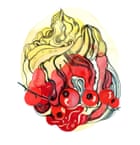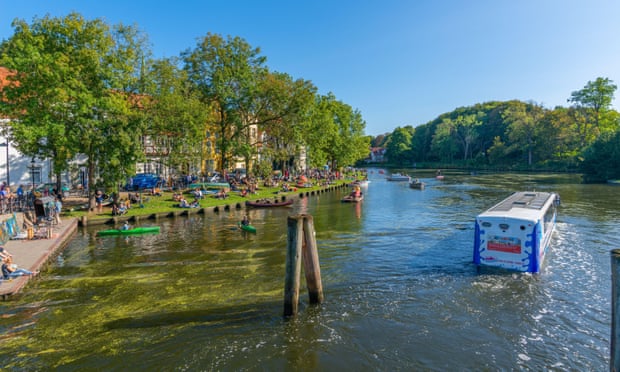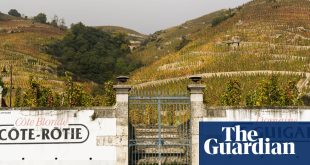Food
Schiffergesellschaft is the oldest restaurant in town, founded 500 years ago by captains of the Hanseatic League, who met there to debate, eat and drink. Soak up the maritime atmosphere at the long, weathered dining tables and try the famous northern dish Labskaus – beef stew with sweet-and-sour garnish, fried quail’s egg and chopped salted herring. It may look a bit strange but it tastes great. In the winter months, traditional pork and kale plates are a speciality.

In the Fleischhauerstrasse area, Erbse specialises in vegan dishes, Soulmates is a boutique ice-cream parlour offering flavours such as black forest cherry, and Nitsche serves delicious veggie deli bowls. Excellent coffee can be found at Cycle Roasters, and the best breakfast – homemade bread, coffee and croissants – is at Konvent, a really nice spot next to the Aegidien church.
Inspiration
Book a tour to climb the stairs of the Marienkirche, the “mother church of brick gothic” – the model for the other brick gothic churches around the Baltic – and one of the tallest churches in the world. From the top, there are magnificent views over the old town island with its seven spires, which is a Unesco world heritage site. For an alternative view, take a cruise on the waterways that encircle the old town (Boat Now, €44 for an hour). You can even take the helm yourself if you want.
The Kulturwerft Gollan is the modern cultural hub of the city. It’s a renovated 19th-century shipyard that hosts concerts and festivals. Inside there’s a really cool brewery called Sudden Death, and a DIY design centre, MachBar, offering workshops, such as sewing for beginners.
Green space
The Drägerpark lies on the banks of River Wakenitz, and it’s where I go with my friends to swim in the natural open-air pool, the Marli, where there’s a three-metre diving board, water slides and paddleboards and canoes for hire. There’s plenty of space for a picnic, a large playground and a kiosk selling drinks and snacks.
About an hour’s train ride away is the beach at Travemünde, with its extensive sands, characteristic wicker-roofed beach chairs and lots of stalls selling fish sandwiches along the harbour.

Neighbourhood
My favourite neighbourhood is the area right next to the Drägerpark, Jürgen-Wullenwever Strasse and its surrounding streets. You can see the status the city enjoyed in former times in the enormous old houses of its former traders. Some of these are still owned by the descendants of the trading families, while others have been divided into apartments. It’s an exclusive area to live in but the abundance of trees and varied architectural styles make it pleasant to walk through. You will pass through this area when walking from the old town to the Drägerpark and taking the Moltkestrasse route crossing the River Wakenitz.
Nightlife
Lübeck’s students tend to meet in Clemensstrasse, which gets really crowded at weekends. Dietrich’s is a cosy little bar with a great range of gins, while Torrios is an American-style cocktail bar which sells its own craft gin, and La Havanna is a small club where Hector puts on salsa dances. Sounds is the most popular club in town, with live bands on Friday nights, and A1 is the biggest and puts on theme nights, such as Sounds of Goa. Over summer weekends, Drehbrückenplatz features musicians and outdoor parties.
Stay
The Ringhotel Jensen (doubles from €130) is on the banks of the River Trave, with some rooms and suites facing Lübeck’s medieval brick gothic Holstentor gate. The hotel dates from the 14th century and is in the “patrician villa” style, with rooms that are tastefully furnished and comfortable.
Tristan Wilken is co-owner, with Constantin Teichert, of Lübeck modern seafood restaurant Fangfrisch
 Top Naija News: Nigerian News, Breaking News Nigeria and World News Top Naija News is a daily news publication in Nigeria, delivering the latest breaking news in Nigeria and around the world.
Top Naija News: Nigerian News, Breaking News Nigeria and World News Top Naija News is a daily news publication in Nigeria, delivering the latest breaking news in Nigeria and around the world.



